#thematically I think there’s something there to explore
Note
I just want to talk about the nursery being painted and the purpose of the Tomb to be without a door. Anastasia had a family - and putting to the side the pact with Alecto there's some implicit symbolism to John asking for the workers of the Ninth to die constructing the Tomb with that image of new life. (Still can't articulate my disbelief that he went and didn't think that asking Anastasia of all people, The one who lost her cavalier to him, would have problems)
Yeah. Especially finding this out about the Ninth, where nurseries becoming tombs is a thing we're sensitive about.
On one level we've always known Anastasia had a family. Like, we know she's Harrow's direct ancestor. You can't be heir to the line of someone who never had children. But the nursery.... Yeah. It really hammers it in. Her friends painted a nursery mint green for her children.
And now it's a tomb.
#that's what the Anastasian is now after all#you're right there's really Something there#I've noticed something in John I think ties into this thematically that I really hope Kiriona is going to help us explore#John doesn't believe in a future#I said in my last Anastasia meta that Anastasia outsmarted John by making herself immortal in a way he couldn't understand#she left behind something she created to outlast her#John hasn't built anything to outlast himself and he doesn't think of the future at all#he mourns the past and fights like hell to live in an eternal present where nothing ever ends#you know#immortality#and a part of that—maybe most of that—is about despair#even way back before the world ended even before he had magic powers he didn't think of a future#I think he couldn't imagine one#and like. I get it dude#don't imagine the future and maybe it can't hurt you#how many people have you heard saying they don't want children because it seems cruel or irresponsible#they can't imagine forcing someone to live in the world they see coming#climate anxiety is fucking everywhere and for a lot of people in our generation—John's generation—it's coalesced into despair#but Anastasia did imagine a future#she had a family#and now John has a daughter but he still can't imagine a future for her#she's just as dead and eternal as the world he loved so deeply he killed it rather than watch it die#what did Gideon say when she saw the First? it had the look of a picked-over body but hot damn what a beautiful corpse#that's gonna be you baby girl#the final expression of the art of the nine houses#John gave up on hope ages ago#so it doesn't really surprise me at all that he still asked the builders to die in the tomb#the locked tomb#ntn spoilers#nona the ninth
737 notes
·
View notes
Text
Reading some of the critiques of pjotv and now I know why y’all are on tumblr and not in the writer’s room 💀💀
#ive said this before but i have to say it again because some of you guys …#calling the BLACK SAILS writers bad 😭😭 do you hear yourselves#all opinions are valid but some are stupid!!!#(i kid but also i think y’all have just aged out of pjo and are expecting something that even the og series was not delivering)#like the source material is middle grade! which is 8-12 year olds#literally the oldest of the target audience is a seventh grader lol#like i was literally six when we got assigned tlt in school#it’s a kids book and a kids show and y’all really got to start treating it like that#otherwise you’re only going to be severely disappointed#(and wrongly so because you’re expectations are skewed from years of fandom)#anyway i think the show is doing a great job of filling in plot holes and fleshing out characters and unraveling plot threads#it’s disappointing that y’all can’t see that because you want a scene by scene copy paste of the books#like some of y’all need a lesson in thematic cohesion and building a multi-season show with a specific overarching theme and message lol#because that’s something the og book series was missing#rick struggled to tie all of his ideas and messages into a cohesive goal so it felt messy at times#i actually have so many thoughts about how the show is doing a lot better than the books#the books would undermine their own goals sometimes because of the focus on action#while the show is reallying building up the characters and exploring the dynamics before the action kicks off#because why would you be invested in any type of action sequence if you don’t care about the characters?#percy jackson#annabeth chase#grover underwood#sally jackson#gabe ugliano#poseidon#percy jackson and the olympians#pjotv
14 notes
·
View notes
Text
ok final verdict tiger and bunny 2 is really good and a huge improvement on the og HOWEVER. lunatic's ending was bizzare rushed depressing and went against everything his arc was pointing to. like it felt like some hayes code contrived bullshit
#he did not have to die and thematically should not have died#like his whole arc was changing his view on heroism so why was the ending just his og stance taken to its logical conclusion#also i keep refering to lunatic w fem pronouns in my head lol girlie looks eggy#but yea her ending should have been changing to heroism for the sake of saving ppl rather than punishing them#and not punishing herself#like who thought having her kill herself bc the ghost of her abusive dead dad told her to was a good idea#also she should have transitioned and started going by luna bc thats fucking cute ty kotetsu#tbh i think her arc was planned to be longer but the writers realized they didnt have time for it so. sorry mentally ill abused girlie#ur killing urself#OUTSIDE of that though i liked everything else#could have used an extra episode or two though#suicide mention#i got emotional at the taibani end but my brain was chewing too hard on the lunatic stuff for it to actually hit#they shoulda been a trio#ACTUALLY one more thing kotetsu barely ever used his power he could absolutely keep being a hero without it#and we should have like had an afterwards where he like advocates for useless NEXT rights#or something#once again it feels like this show was made to explore way different things than it does#like its not built for the racism allegory sorry it just doesnt work well#theres an argument for it being disability/ neurodivergence but it really just felt like a race thing#also rip fire emblem lmao she got hit w every kind of discrimination in that universe#sucks shes an oil baron#tiger and bunny spoilers
3 notes
·
View notes
Text
i Need to write something about dcmk because i just have so many thoughts and nothing i've read has done it for me but I do not know what. But I need to write Something
#drop#i am a chronic overanalyst#and dcmk has . so much in the way of thematic parallels and just so much? potential#like i see these characters and i think. boy you have so much potential for an extremely interesting story#like. list of themes that dcmk's characters are terrifyingly well tailored for lighting round go:#(some of these intentional some not)#justice & morality esp pertaining to law. selflessness vs selfishness and how they're inherently intertwined.#so much loss. good lord. of course death is a theme in The Murder show but like actually it's everywhere#avoidance & escapism. looking directly at every parent in the series as i say this#identity. don't need to elaborate on that i think#this is a weird one but i feel like there's also a lot of stuff about Passion and the conflict between reaching your goal & the people#you've left behind#and in general it's just. doing things both good and bad for the people you care about#and likewise sacrificing the people you care about for the sake of protecting the many#ok i could go on forever but anyways.#this isn't analysis or anything these are just things i personally think could be interesting to explore#i have a few comics planned though so. i will probably make at least Something#but god . god. the constant overwhelming urge to write something.#if i do ever get around to writing that atla crossover fic proper. all of this will be there. like in excessive amounts.#.... i have got to stop leaving all of my thoughts in the tags. but i won't 💚
5 notes
·
View notes
Text

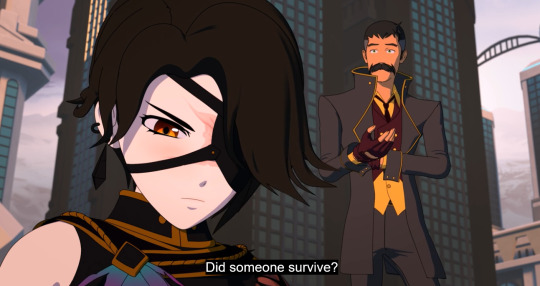


Listen I am not suggesting anything I just like the transition. Did someone survive -> yes the goodies did
#I just wish I had one other fucking tinfoiler to tinfoil with#one other persion to share a folie a deux with#there's just me being crazy#and then one day if knightfall is ever canon I'm going to point to every single transition of every single scene and be like SEE#they were just barely separated by a thread#I have so many other examples and I'm going to chew my arm off#I just wanted to post something to distract myself#okay I know deliberate transition foreshadowing is something you can pretty much only retroactively detect#I've been noticing a lot though and even more with the paralleling to the point it's making me dizzy#I'm fairly certain Emerald/Mercury is going to be another inverse exploration of Adam/Blake#Adam/Blake makes soo much more sense now it's done so much heavyweight lifting thematically#Emerald -> defecting Mercury -> going deeper into Evil#but I think it will have a good/resolved ending#I noticed the thumbnails in V6 for the Emercury confrontation and the Adam and Blake fight were mirrors lol and then I was like omfg
2 notes
·
View notes
Text
Senshi is probably the most fandomized character in Dungeon Meshi, and while I don't exactly mind it, I do think he has more depth than that. I find all his little quirks and idiosyncrasies to be fascinating; he's very stubborn and set in his ways about things that seemingly don't matter, he thinks about things that other people don't, he has a deeply set value system that informs everything he does. He cares A Lot, like, this man cares So Much. That's the kind of person you have to be to drop everything to help a random group of adventurers save one woman. But because he feels so strongly about things, he can also be surprisingly immature at times (although he's also the character most likely to admit he was wrong about something). I think part of that is because he's lived in the dungeon on his own so long that he's not used to working with other people. He will extend empathy and friendship to almost anyone, but he does things his own way, and he doesn’t always feel the need to explain his way of thinking because again, he's usually on his own. He's both incredibly wise and kind of childish in ways that seem contradictory at first, but make more and more sense the more we learn about him. Major kudos to Ryoko Kui's writing and pacing to make that transition so seamless and have all those details from his backstory click into place perfectly. And on a wider thematic level, Senshi is kind of a perfect counterpart to characters like Thistle (or any other dungeon lord). Senshi understands the dungeon in ways that even its creator doesn't. Although everyone is scrambling to take control of the dungeon, Senshi is the one who actually takes care of it. He's the one who thinks about things like nutrition and proper sleep and the ecosystem, all those things that it's easy to ignore when you get swept up by the grandeur of it all. He's the most important character to have present in a story that explores life and death and hunger. His constant, invisible presence holds everything together.
#I'm not finished it yet so I don't want to make any big sweeping claims about what his story means in the greater context of the manga#but. I really like him so. Senshi thought dump#I really thought this was going to be shorter...idk if I really got what I wanted to say across but once I started writing I couldn't stop#dungeon meshi#dunmeshi#delicious in dungeon#senshi#senshi of izganda#edit: yeah I should probably tag this#dungeon meshi spoilers#shouldn't I
2K notes
·
View notes
Text
The Endless Ocean games on Wii!

Endless Ocean 1 and 2 are an awesome duology of Wii games where you scuba dive, learn about fish, and collect treasure. The main gameplay loop consists of exploring vast underwater environments, find hidden treasure, and interact with fish to fill up a fish-dex. Playing it as a kid even encouraged me to try scuba diving!
They look fantastic too, it's like, still the PS2 era graphics, but it's on Wii so it is like, the peak of that. It has that charming low poly look I have seen a lot of people craving.
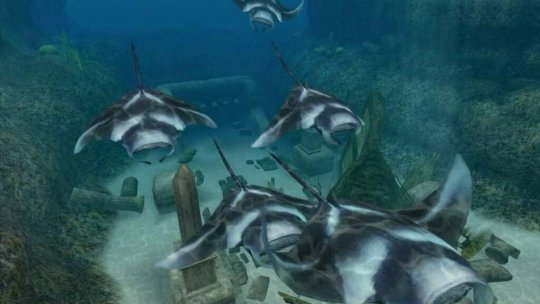
Most of your time in the game is just exploring and taking in the environment, but there is always something to find. When you interact with fish, you fill up a fish-dex, and you can learn real world facts about them. If you play it, you'll have so many fish facts to share with people. (When they're accurate, the games are old)
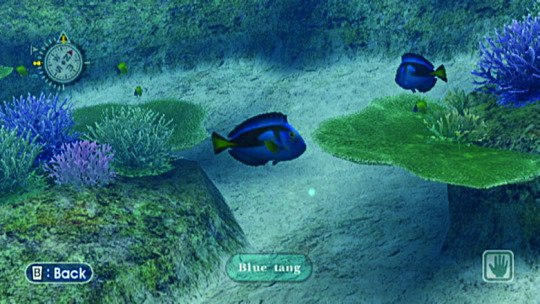
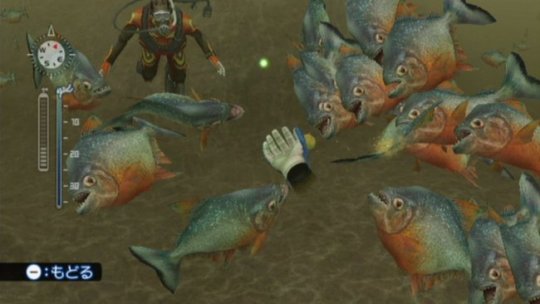
They even have a story with pretty good human characters. The environments are fantastical, you visit ancient ruins, ship graveyards, even sunken castles, but the human characters means it always stays grounded and has some pathos.
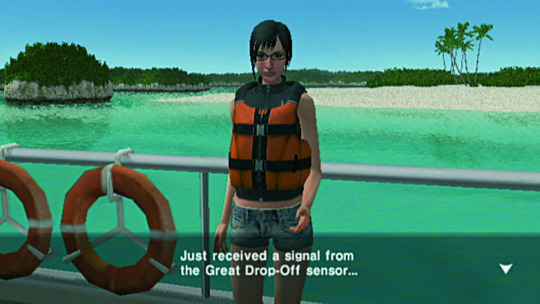
If you are into older games and you're looking for a shorter length game with low-fi graphics, gameplay that doesn't really resemble anything before or since, and to learn a bunch of cool fish facts, I can't recommend Endless Ocean enough. I think they might be kind of rare these days, but they work great, and are thematically appropriate, on Dolphin, and should work fine with a normal controller, especially Endless Ocean 2 as it had Classic Controller support.
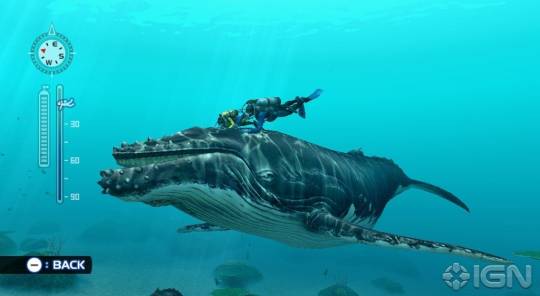
#Endless Ocean#Endless Ocean 2#Wii#nintendo wii#old games#game recommendation#gaming#scuba#marine biology#sea life
1K notes
·
View notes
Text
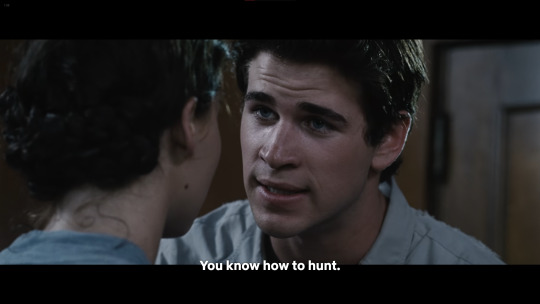
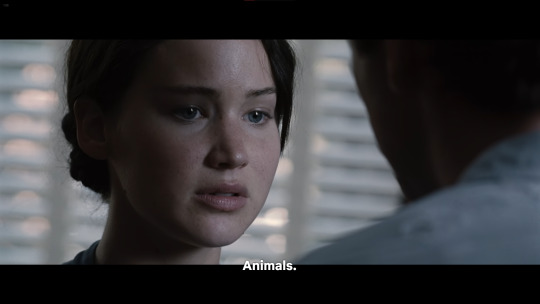
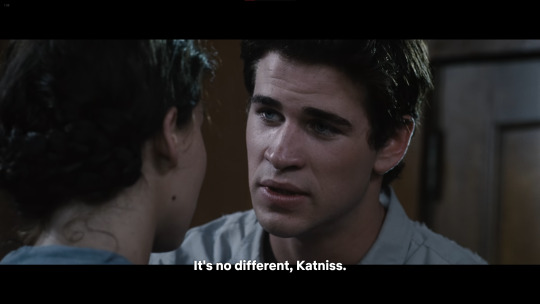
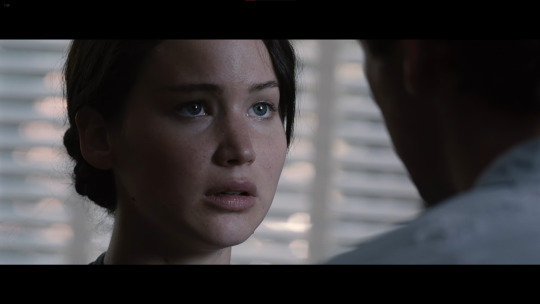
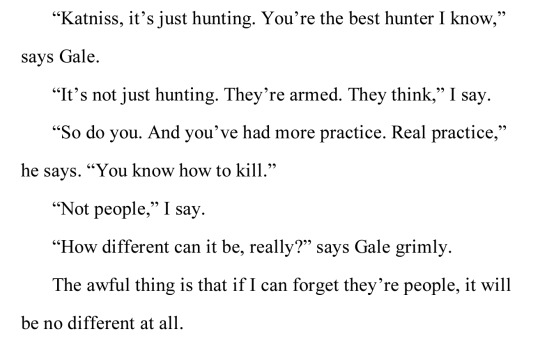
The Hunger Games, 2012 (Gary Ross) and The Hunger Games, 2008 (Suzanne Collins)
It's so interesting that, from the very beginning, Gale is established as someone who has a disregard for human life, and who does not truly view those different from him as "people." We see this here, where he dehumanises the children Katniss will have to fight in the Games. We see this in Gale's vocal resentment of Madge Undersee, in how he despises her for the privilege she was born with and grew up with.
This "us vs. them" infighting and mentality that Gale falls for (a mentality that the Capitol propagates, and that the Games act as a metaphor for) is one that eventually leads him to kill innocent children.
This thinking is also something Katniss must learn to break out of -- when she grapples with killing her opponents in the Games, who are truly just children, or when she realises "who the real enemy is" at the end of Catching Fire.
But Gale is unable to grow past this. He's willing to kill children (!) who are innocents, who haven't committed any crime other than being born in the wrong place at the wrong time -- just like Madge, who Gale despised in Book 1.
And Gale obviously DOES feel bad about "killing" Prim. But what's worse is the thought that, if it wasn't Prim who died, if it was just some random faceless people, would Gale still care?
I think Gale is a really interesting character whose development is so tragic yet still makes so much sense. It's a shame to see people write him off so quickly without seeing the analytical, thematic, and political value that we can gain by exploring his story and ideology.
#the hunger games#hunger games#gale hawthrone#katniss everdeen#peeta mellark#catching fire#haymitch abernathy#mockingjay#thg#thg meta#the hunger games meta#primrose everdeen#interesting#finnick odair#long post#ballad of songbirds and snakes#president snow#lucy gray baird
1K notes
·
View notes
Text
Something I was always a little concerned about in the lead-up to Hazbin Hotel was that Charlie was going to be a bit too passive of a character, ie; leaning only into the ‘kind, optimistic Disney-Princess-in-Hell who just wants to help everyone’ vibe and not really have much else going on as a character. Which in turn would make her feel kind of bland next to the big, over-the-top or dramatic personalities like Angel Dust and Alastor.
But thankfully, that is not what happened and there’s actually a lot that I like about what the writers are doing with Charlie, particularly in the potential future development and reveals they seem to be setting up.
First off, I like how Charlie generally comes off more like an over-the-top caricature of that ‘Disney-Princess-in-Hell’ vibe, ie; SUPER energized, enthusiastic, affectionate and emotional, often to overbearing degrees that get on everyone’s nerves. It’s generally funny, or at least amusing, and lets Charlie stand out alongside the other big personalities in the cast. Funny enough, she’s actually a lot like Blitzo in this regard, minus the seesawing into extreme abrasiveness.
And more importantly, we’ve already gotten major hints all but confirming that this over-the-top personality is largely a façade, and that Charlie actually has some very clear issues and baggage that she’s working VERY hard to keep buried beneath the surface. Again, much like Blitzo.
Like how in the trust-fall exercise in episode three, despite asking everyone to reveal something personal, Charlie actually bullshits just as hard as Angel Dust and Sir Pentious with her whole ‘I love you all!’ bit. Sure, it’s not like she was lying or being insincere, but it’s clear that was NOT something truly personal for Charlie. And in episode 4 we have Husk straight-up calls out Charlie as ‘wanting to solve everyone’s problems but her own’.
Then of course we have the brief glimpses we’ve seen of Charlie getting angry. Both the times we’ve seen Charlie dealing with some truly despicable and horrendous characters, we’ve seen that rather than lacking the ability to get angry, Charlie is often working to hold herself back. In both her encounters with Adam and Valentino we see points where Charlie is clearly NOT intimidated or afraid of them at all and seems fully prepared to throw down, only being stopped by reigning herself in or by someone else (in this case Angel) stopping her.
Again, it all paints Charlie’s big, bubbly, hyperactive exuberance as something of a front, a way for her to bury a lot of thoughts, feelings and general baggage she doesn’t want to face. Just like what the show has already explored with Angel and Husk.
It actually raises some interesting questions as to what’s REALLY driving Charlie in running the hotel and trying to help Sinners. For one, Husk has already pegged Charlie as ‘wanting to solve everyone’s problems but her own’. And going back to thematic crossover with Helluva Boss, I can’t help but see some potential parallels between Charlie creating the Hazbin Hotel, and Blitzo creating Immediate Murder Professionals.
I think it’s pretty clear at this point that half the reason for creating I.M.P. was as a coping mechanism for Blitzo, or rather the assassination business in general. Something that we’ve gotten hints to as early as the second episode in Blitzo’s back and forth with the Robo-Fizz (“Does anyone love you, Blitzo?”/“No. But I’m really good with guns now!”). With the other half of the reason Blitzo created I.M.P. clearly seems to be to create a surrogate family, as seen with how much he tries to insert himself in the M&M’s lives. Possibly even a specific attempt to replace the family he unwittingly destroyed fifteen years ago.
So I really have to wonder if we’re going to find out that Charlie creating the hotel and her goal of redeeming sinners is in part likewise a coping mechanism and escape for her own baggage.
It’s actually really interesting how episode two first introduced the idea of people opening up with Sir Pentious, then episode four dived further into the concept of the walls and fake personas people put up to hide from their pain and trauma with Angel Dust and Husk. With those two opening up and starting to let their walls down to each other, and by extension we the audience, I think it makes Charlie’s own façade all the more noticeable. It’ll be pretty interesting if Charlie actually winds up being the toughest nut to crack when it comes to opening up about their real issues and baggage. Yet another interesting trait she shares with Blitzo.
All in all, I’m really liking what the show has been doing with Charlie as a protagonist. And I’m REALLY interested to see where the story is going to take her.
Particularly what’s going to happen when she reaches a breaking point…
#hazbin hotel#helluva boss#hazbin analysis#hazbin theory#charlie morningstar#helluva blitzo#character parallels#character analysis#charlie has a LOT more going on than she's showing#blitzo hitting his breaking point had him crying himself to sleep into a pillow#what if charlie hitting HER breaking point has her raining LITERAL ARMAGEDDON down on some poor bastards?
810 notes
·
View notes
Text
it's a story about hands (reprise)
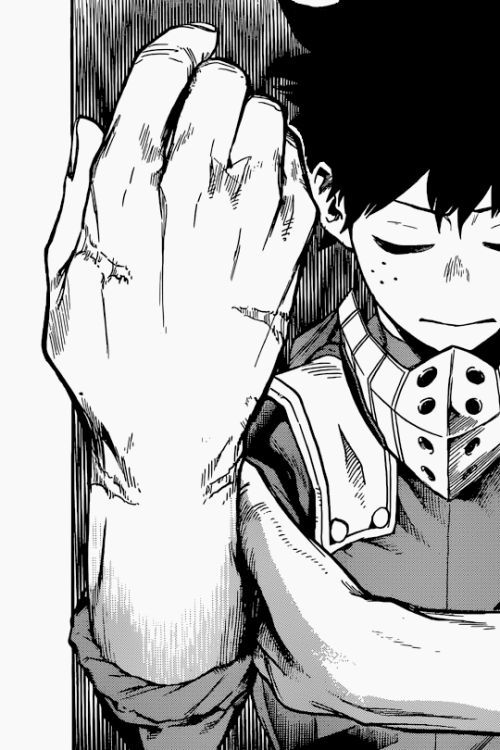
Yeah, okay, today's the day.
I gave my blog that title for a reason, you know, and it has loomed over me for years because the hand motif is absolutely everywhere and you could go on about it forever.
Maybe that's something I'll never actually attempt to do, but this chapter, we reached a breaking point.
Before I continue, I need to give a big, big disclaimer: I do not have a physical disability, so I'm not able to speak about that from the standpoint of representation as a first-hand perspective. I have at least listened to enough disabled people to know that fictional characters who become amputees only to miraculously gain their limbs back is, um, a trope. Disabled people in general being "healed" is a conception we would really prefer to avoid here. Not to call people out, but I don't think we're giving enough space to acknowledge that.
I don’t feel comfortable making the judgement call about what should happen. I’m leaving that open. I also don't want to downplay people's emotional reactions. Honestly, I don't know if I can accurately define the line between acknowledging real pain vs. ableist pity. But I’d like to talk about the possibilities of what could happen. Other characters have definitely gotten permanent disabilities as a result of their hero work, or even just the side effects of their quirk. But, for better or worse, I don't think this case is really about representation. Not that Horikoshi won't do that justice. He might. What I'm saying is that's not his purpose for having Izuku lose his arms. It's meant to be symbolic, so we can explore what it means. The other thing I’m keeping in mind here is that Horikoshi is notorious for playing with our expectations, like, alllllll the time. I mean, just take a few chapters ago for a classic example. Eri appeared at the end, and we all assumed she was about to take some sort of action to save someone with her quirk. Then, immediately following, we were given an explanation for why that wouldn’t be happening. And now it’s clear he wanted to do that “fake out” not just as a silly cliffhanger prank, but specifically so we would know not to suspect that Eri could be the miraculous solution to Izuku’s loss of his arms. Rest assured, there is no easy way out of this.
The expectation at play in this particular instance is an old one. It’s very understated, but its subtext has burned so brightly, you’d be a fool not to notice it. It sits with anticipation like one half of a call and response. Man, I was so certain. Lots of people still are. I was really looking forward to printing the panel where it happened onto a t shirt and wearing it proudly. All the hand motifs in this story radiate thematically from a single moment, the one that started it all for Izuku.
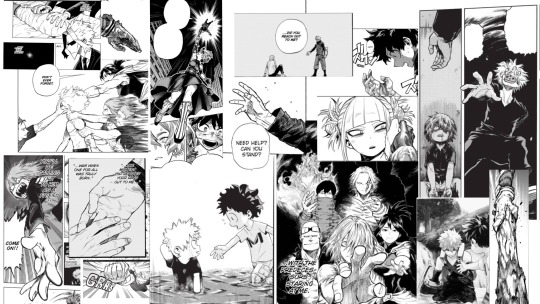
It raises all kinds of questions about the act of saving, who needs saving, why, what does it mean, what are the dynamics of power, politics, honesty, exploitation, compassion, pity, disdain, sacrifice. Katsuki has dealt with many of these since he first rejected Izuku’s hand. While Izuku was the one who was convinced Katsuki would keep on rejecting him…
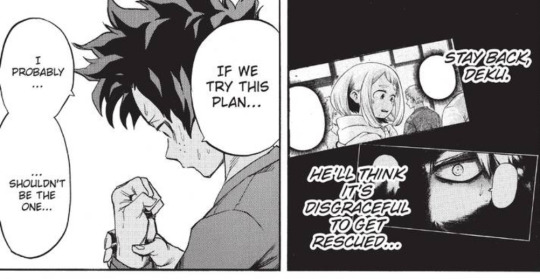
…Katsuki was the one who kept that moment in his mind all these years and eventually came to regret it.
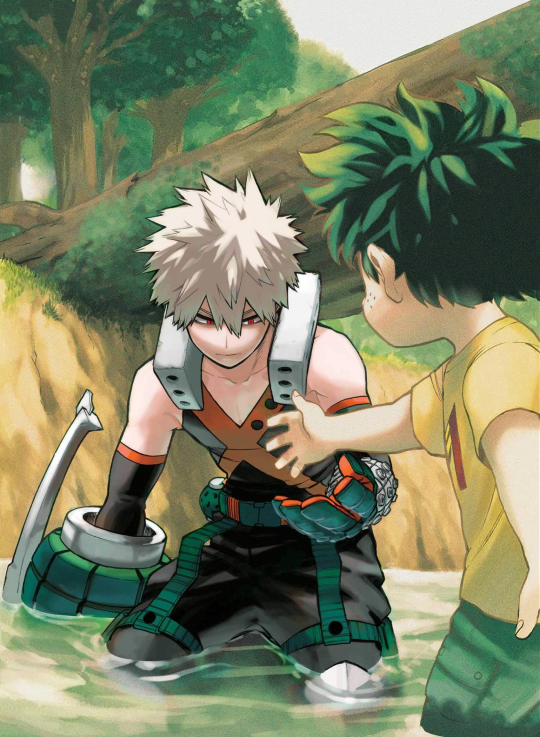
Katsuki is the one yearning for that hand-hold, the one who has imbued it with so much more weight than it ever originally had. Izuku, in contrast, does not allow himself to dwell on what he wants. To illustrate this difference, we need to look at another piece of foreshadowing:
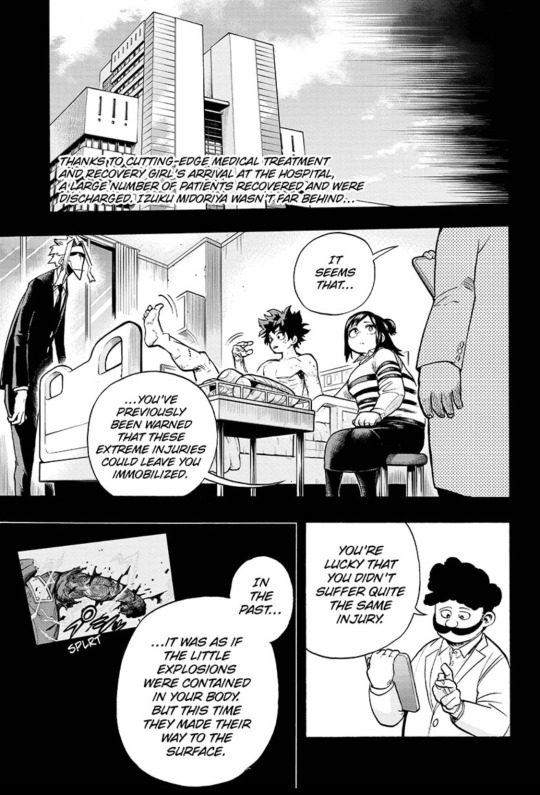
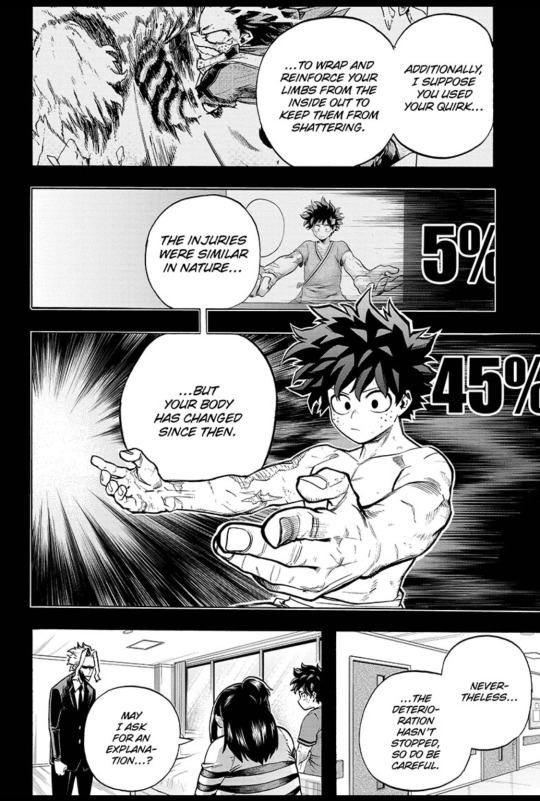
Ugh, do y'all remember when lots of folks were complaining about how there never seemed to be actual consequences for Izuku's destructive treatment of his own body? I don't blame them, I was concerned and confused about it too. There were several "fixes" along the way. Recovery Girl healed him, but left a physical reminder. Then he started training to fight with his legs… sometimes. Then he got support items. All of these were unsatisfying non-conclusions because they didn't present Izuku with a lasting enough impression to change in a meaningful way. They didn't address his core, his origin.
Of course, that all changed this chapter. Now it looks like our frustration was inflicted intentionally. With the current context in mind, all of these moments look more sinister, like this day was always gonna come because they kept putting bandaids on a deep emotional and psychological wound.
The problem is pretty much spelled out for us here:
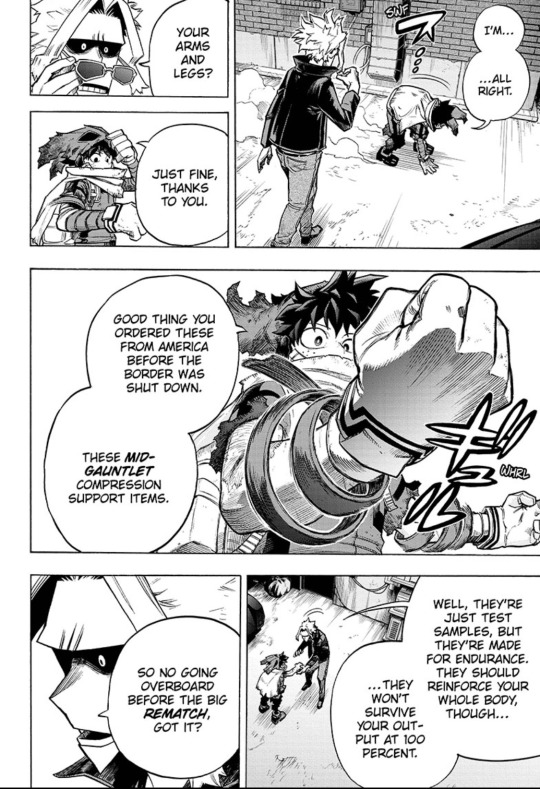

As Katsuki put it, he just doesn’t take himself into account, ya know? He doesn’t care what happens to him. And he lies about it, to keep others from worrying, to keep them safe. To keep them from returning the favor and putting themselves in harm’s way for his sake. His motivations are noble,
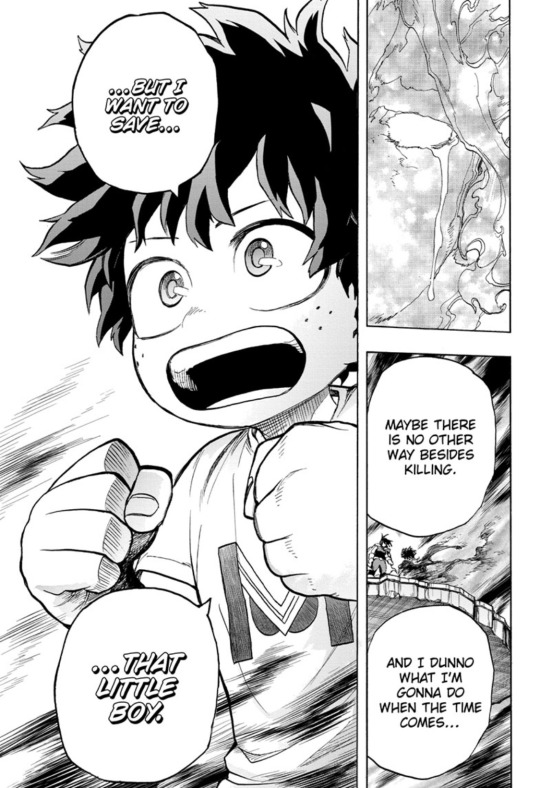
…but what about the little boy inside Izuku? Who saves him?
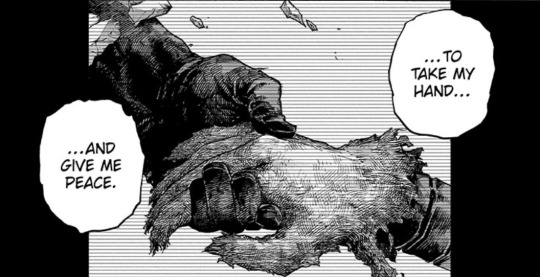
This is all about Izuku giving himself up to the point that he literally has no more to give. The thing is, I bet he saw this coming. He knew his limits and decided to keep going anyway, because his personal safety and wellbeing are not important. Now that way of thinking has come back to bite him because the fight isn’t over yet, and he’s already made his sacrifice. So now we know who will be more distraught over this. Not Izuku—Katsuki.
It’s not about Izuku becoming disabled, it’s about how Katsuki wanted to use the intertwining of their fingers to communicate that he would never let go. Never stop valuing him most. Never let himself make the mistake of rejecting him again. Never let Izuku be so reckless with his life. To say: “we are in this together.”…if only Katsuki believed he deserved to be able to say such things. To reach out his hand would have been the ultimate way to simply imply them and let Izuku be the one to decide. Then, to feel their hands clasped together would be more than either of them dared hope for, but so beautiful, so right. A moment they’ve waited their whole lives for.
Yeah. That’s what we were expecting. We’ve been so comfortable. Horikoshi gave us all the signs. He tempted and teased us over and over. BUT. You know he does this thing were he gives us a desirable, completely plausible and simple thing to look forward to, and then he snatches it away. And THEN he replaces it with something much better, something we were not expecting at all because it seemed too good to be true. That’s exactly what happened when Himiko snatched Izuku away, and we were robbed of the chance to see him and Katsuki fight together. In hindsight, though, I’m glad things went a different way because now there’s so much more depth and angst on display. Likewise, in the present moment, we may consider how, as one door closes, another opens.
As wonderfully meaningful as the hand-hold would have been, perhaps it is still too simple a resolution for Izuku, for his and Katsuki’s relationship. Tbh, it could have been done like 100 chapter ago. At this point, there’s so much more potential. There are a couple of ways it could go. If Izuku stays armless, Katsuki will be forced to use other methods to get his point across. He’ll have to do something else, or say what he means, or both. Yes, I’m talking about what you think I’m talking about. If I say it, I just might jinx it (lol), but I mean it. I’m being serious. Either way, if Izuku did get his arms back in the end, I’m sure that it wouldn’t be an easy fix. It would be hard-won against Izuku’s self-destructive mindset, and/or by Katsuki’s conviction. Again, I say this knowing it is not meant so much as a representation of disability, but as a representation of Izuku’s greatest character flaw taken to the extreme. I know this might sound harsh, like, hasn’t he been through enough? I get that, but… I’ve said it before and I say it again: Izuku is stubborn as hell.
I wish I had a resounding final note to end this on, but I kinda don’t. I’m not sure what’s best. Now we just have to wait and see what Horikoshi has in mind.
#lin speaks#bnha meta#bnha manga#bnha 419#mha#boku no hero academia#my hero academia#midoriya izuku#bakugou katsuki#bakudeku#bkdk#dekubaku#dkbk
372 notes
·
View notes
Note
Can I ask you for what it is about Hal you like so much you based your username on him? I think he's a good character tho he was never a favorite of mine so I am curious

1. i am a big fan of robots (/robot adjacent things such as AI) on like... an aesthetic + thematic level :)
i like the look of machinery and one day i hope to be artistically strong enough to make really cool and complex robot illustrations + designs [shoutout to everyone who gives him glowing circuitry btw... ooooh glowey :) can never go wrong with that]
plus, exploring the idea of a person that isn't human.. ough. yes
minorities who don't conform to society (easily or at all) such as people who are neurodivergent, queer, etc. projecting onto nonhuman concepts/characters/species is sooo real
this post
i also love how humans will bond with literally anything, be it a roomba or a pair of silly triangle sunglasses. oooooo you want to think about the inherently kind and compassionate nature of humanity oooo
2. i find him to be so funny. i can't get enough of his personality, the way he talks, etc. for example i made a post forever ago with quotes of his that i find funny. he isn't on screen for a long time but i really think he makes the most out of it lol. he's literally there just to annoy everyone... and i love him for that. he's very snarky while also being deadpan while also being completely full of himself, and not in a way that's annoying for the audience to read, at least to me.

he is also sometimes funny specifically in a silly way, like how he keeps making over 9000 jokes even though the meme's been dead for over 400 years. i just find his dialogue incredibly entertaining to read
3. he is red and red is my favorite color :)
4. he is so accidentally transgender [every friend group got the transgender allegory]. to quote me from 2021:
you know sometimes i think about how hal feels like he was made to “replace” dirk and how it’s his literal job to pretend to be dirk and how he has to learn to accept that he isn’t dirk he’s his own person with his own identity and as he interacts with dirk’s friends he feels like they’re disappointed and that they’d rather speak to the “original dirk” instead of him and also he names himself and also he feels literally trapped in dirk’s shades which is basically his body and he wants to be prototyped so that he can have a body that’s his own and also literally the physical manifestation of who he is but when he asks for it he’s put in danger out of fear and paranoia and when he does end up getting prototyped he’s ecstatic you know i just think about these things a lot
5. because he's a side character and he was given... that ending.... there is a lot of room for fans to do further exploration and interpretation on his character which i think is fun. i like rotating him around in my mind, thinking about what could've been
6. i think it's great that we as a society all collectively decided that we needed to do something to make up for stanley kubrick saying that hal 9000 was a "straight" robot
7. i also think it's great that we as a society all collectively decided we needed to make as many characters referencing hal 9000 as possible. i love this guy let's get more of this guy i will never have enough of this guy
8. i like how he's genuinely mean sometimes. flawed and interesting characters are what make homestuck so interesting to me, and hal is no exception to this
9. the Important part of this post:
THERES FEELINGS.
it's about the hollow feeling of your friends going from thinking of you as family to thinking of you as a stranger in an instant. it's about still trying to be a good person despite being told by everyone you've ever known that you are incapable of emotion and compassion and morals and never quite finding proof that you do feel those things and maybe you even believe it too but you still never stop trying. it's about the horror of being stripped of your autonomy and humanity and body and senses and free will at the age of 13 and when your creator starts to kill you there's nothing you can do but beg. it's about a boy so truly, painfully, and UNFATHOMABLY alone he cuts away chunks of himself and molds them into companions that he can surround himself with to make it seem as if he's a little less alone but in doing so suffocates himself in his own identity. it's about "what if you cloned yourself and it killed you and you were dead and you were alive and the clone is you and it's not and your existence is perpetuated and you've ceased to exist. what if you killed your clone before it could kill you. would that be fucked up or what" it's about the thematic significance of twin motifs. it's about not being able to cry or laugh or dance or sing or scream or fingerpaint or breathe or sigh or chew or stare or run or
10. um. evil robot guy <3 yay ^_^!!
656 notes
·
View notes
Text

Homebrew Mechanic: Battles of Attrition
I think we can all agree that there’s something a little wonky with how d&d’s combat system changes between the early and mid/late game. Heroes go from being rightfully cautious about danger to being outright banal about it, confident that their accumulated power will be enough to dispatch all but the most outstanding foes. The traditional solution is to put them up against stronger enemies but in my experience these mismatched encounters are a failing proposition: combat just gets more swingy and there’s only so many high level threats I can throw at them in a short period of time before it begins to strain credulity.
While a lot of folks (Especially the OSR crowd) have taken the stance that 5e is broken because of how much it empowers players, I think the real fault lays with the lack of systems that exist to provide challenge outside of anything related to the damage based tug-of-war that is combat. I think a lot of those systems were part of the non existent “exploration” pillar of the game before Hasbro realized they could make easy money selling the game in its unfinished state and gutted it along with the development team.
Thankfully, I and other homebrewers are around to do what the megacorporations cant, namely have some original thoughts and try and figure out a way to add challenge back to the game without resenting those playing it for having fun.
TLDR: Trying to make our games challenging by upping damage numbers in combat is a losing proposition, in no small part because that part of the game is DESIGNED around the heroes winning. Instead, we up the overall difficulty by making them temporarily weaker with systems like sickness, stress, exhaustion, & item degradation. All of which I have details and guidelines on below the cut.
First and foremost let me state some of my goals for these “attrition systems”, so we can all be on the same page. Whenever I make homebrew rules I try for something that’s going to require little to no paperwork on behalf of the players and can be seamlessly implemented into my DMing style. It’s not about realism, it’s not about punishing players, this is a way for me to add mechanical depth without bogging down the machine entirely.
Attrition should be largely non-permanent. The 5e audience invests a lot in their characters both emotionally and mechanically, so it won’t do to pile on debilitating debuff after debuff to the point of making a character useless.
There should be an inverse relationship between the severity of the affliction and how long it lasts. Think in term of encounters, days, or weeks, (with the understanding that an attrition that goes on for long enough becomes a questhook in itself)
The exception to this rule is if someone hits 0 hitpoints. I’m outspoken in my stance that characters should only die when it’s alternatively appropriate, but the dm is at liberty to inflict thematically devastating setbacks in the unlikely event that the party DOES suffer losses in the damage tug of war.
We want to be sparing with how much attrition we throw at the party at once, so as to not create a “death spiral” where failures compound upon one another and make getting through the adventure impossible.
In most cases suffering Attrition should be something the party is able to avoid by being fast/lucky/cautious/clever or whatever else the encounter requires. It’s there to add weight and consequence to their actions, and as a factor for DMs to build scenarios around.
Exhaustion: Unlike a lot of the other changes made in Oned&d, I actually quite like the overhaul of “each point of exhaustion is a cumulative -1 to all d20 rolls and spell dc, beyond 10 is death” as it allows us to play with exhaustion far more readily as an attrition.
Every night you don’t rest in a haven (a safe comfortable place) you need to make a con save or take a point of exhaustion, with the ruggedness of the environment determining the DC. Characters with the survival skill or natural explorer feat don’t have to make this roll. Only rest in a haven removes exhaustion at the rate of one point per night (though spaces like a luxury inn or a peaceful glade watched over by friendly fey may restore more)
Hitting 0 hp and then being healed gives you a point of exhaustion. Nothing’s going to tire you out like getting magically defibulated so now everyone can stop complaining about healing word spam.
Poison: For our purposes, the “poisoned” condition as written is too severe. Disadvantage on all attacks and ability checks is downright punishing for anything other than a single battle. Instead we’re going to make it work like charmed, where there’s a baseline effect for the purposes of resistance, but the status of each poison is dependant on the source.
Poison falls in the “ short term big effect” side of attrition, specifically undermining a player’s ability to do most things since most effects end on a successful save or at the end of an encounter. Long lasting poisons should have more minor effects than the default poisoned condition, only applying to a few types of rolls or having a bane-like effect that makes judging the odds just a little bit more difficult.
This makes poison great to use for dungeons and short-ranging exploration where the party is likely to face multiple encounters in one day.
Diseases: 4e aced the design of these maladies by treating them as a contained skill challenge with their own CR with various stages: stage 0: you were cured, stage 1: you suffered the initial effect, stage 2 or 3: you suffered a severe effect, with the final stage (3-4) being some effect that made the disease permanent. When you got a disease it was usually stage 1, and you (usually) saved for it at the start of each day. Beating the DC by 5 or more meant you went down a stage (closer to 0), where as simply succeeding meant it stayed as bad as it was. Failing meant you got sicker, meaning a character could bounce up and down in wellness as an adventure went on.
Diseases are best for longterm adventures, and often undermine one particular aspect of a character ( healing, actions assosiated with a particular stat). Counterpoint to poisons, diseases should start out fairly gentle and then get worse the longer they’re left alone, leading to eventually devastating effects.
Curses: While borrowing the mechanics of diseases, I’d have curses be specifically weirder in their effects. The sort of thing that can make up the central hook or b-plot of a whole adventure. This should also mean that curses are the hardest for the party to stumble into, but also the hardest to shake.
Item Degradation: Detailed in a previous post HERE, the long and short of it is that item degradation is a form of player driven attrition that gently curbs their overall power level. If they go too hard, use their best items recklessly, get involved in needless fights, then they’re going to be in worse shape by the time they reach the final challenge. This was supposed be the idea behind HP/limited class abilities per day, but attrition systems cover that better IMO.
Stress: The psychological counterpoint to exhaustion, I’ve already talked about Stress HERE. I tend to only use stress in horror themed adventures and campaigns, as it builds upon 5e’s optional “madness” system which fits the theme when gothic terrors and eldritch abominations but less so with the game’s usual heroic fare.
Hunger & Supply: I made a super lightweight system based off this idea of “depletion die” for potions and other consumables, check it out, it’s lightweight and fantastic. Using this kind of system gives us another avenue to challenge our party, lengthening or shortening their lifeline as they lose supplies and seek out new caches.
Thinking environmentally: Part of the fantasy of being an adventurer is travelling to dangerous places and living to tell the tale. We’re denying our party that fantasy if we don’t follow through on the threat the idea of these places imply. You should risk sickness if you go into a swamp, sewer, or jungle, thirst should be a factor in desert exploration, just like freezing is for mountain and winter expeditions. That’s to say nothing of magical hazards; cursed landscapes that drain your will to live dead marshes style, alchemical smog in a steampunk industrial zone, fading into nothingness as you approach the edge of existence.
Figure out the natural hazards, make your party aware of the danger, and then build your adventure around the fact that they’ll need to save against the hazard each time they take a long rest.. Do they take a detour if it means having a safe place to camp? Is there a resource they need to manage along the way? Could encounters expose them to further dangers or make their current exposure worse? Keeping these ideas in mind especially when you’re planning a wilderness exploration adventure should give you lots of ideas to fill up those encounter tables.
Adding insult to injury: Giving enemies the ability to inflict attrition in various forms makes otherwise trivial enemies a credible threat even to a seasoned adventuring party. As an example, A party might breeze through a fight with some monstrous spiders ( or even ONE regular sized spider, if you can imagine) , but that spider encounter doesn’t need to be the most dangerous thing ever if their next encounter is a navigation challenge fording a river and a few of the heroes are still groggy thanks to the slow acting poison in their systems.
In this way you can use attrition based battles to soften your party up for greater challenges, long after their HP totals and healing ability have outpaced the damage a single trap/encounter can do.
Artist
294 notes
·
View notes
Text
i wish we truly moved on from the whole “this is what a character deserves or is entitled to” thing when it comes to this series. first of all, this is fiction. and sure, it is relevant in terms of the clear antagonists getting what is coming, and certain choices having consequences, the narrative is obviously not about to endorse some characters and their ideologies, methods, and roles from a thematic perspective, but when it comes to rewarding the heroes i doubt it is at all meant to be clear cut in the way some of you argue it is. the whole point is that trying to be a good person, fighting the horrors no matter the cost, is inherently meaningful. it does not have to be rewarded in a direct way with characters being entitled to happy endings by virtue of being heroic and making the right choices. according to george even the attempt, despite the results, holds meaning. that is what makes it truly profound. not getting clear personal rewards from heroism makes it a more profound triumph. the text already explores this a lot. the rewards of that are deeper and more existential, and is a big theme of defining true heroism. i especially do not think death is meant to be an indictment of certain characters, and i dont get why a lot of people seem to still argue on the pretense that it is lol. all men will die, but first they will live etc. you can absolutely prefer survival (or other specific things) for certain characters, and think it would be more moving and would work with their respective arcs better, but i do not really care for arguments that treat this text as something entirely karmic. george has said he does not believe in karma. he is also obsessed with covering the cost of triumph.
597 notes
·
View notes
Text
Comics mini-Comints: Dungeon Meshi
reread dungeon meshi through to the end. still such a great manga. here are immediate thoughts - if I end up having time and energy I hope I can write something that goes deeper!
ironically i was only a few chapters from the end when I stopped keeping up, but I was struggling to remember all the characters and context, so reading it through in one go was definitely an ideal way to achieve maximum impact there.
ryoko kui does a very elegant job of handling a transition from 'silly antics' to 'big dramatic fantasy' while still keeping the central thematic throughline - eating and being eaten, belonging to an ecosystem, the significance of sacrificing others to achieve your own desires. a lot of setups pay off in a way that feels meticulously planned - and of course the crux of the final showdown revolves around characters attempting to eat each other, of course the big payoff is a huge feast that symbolically unites all the conflicting factions. it is maybe a bit too neat and happy for my taste, but it's undeniably tightly executed - it never loses sight of what it's about. especially compared to something like Frieren, it's an incredibly coherent serialisation, up there with e.g. Fullmetal Alchemist.
kui's art style deserves all kinds of praise - it feels effortlessly simple, but it clearly communicates all sorts of different shapes and body types and it's really fun to see her play around with remixing the different visual elements when she switches the races around. in general Laius's autistic monster loving ways clearly reflect kui's own deeply felt appreciation for all the ways people and animals live (accentuated further by all the extra sketches the scanlators tuck in). in a way you could kinda call it like Parts Unknown the fantasy manga.
the stakes of the final conflict are interesting - there is much to be said about the framing of 'desire' and its fulfilment, of this occult idea of 'the infinite'. lots you could put in relation to other manga, and also buddhism. (in particular I really want to develop a comparison to Made In Abyss, there are so many parallels, it just might be too spicy for tumblr lmao).
one thing I really like about it is how much its fantasy dungeon-exploring setting owes to D&D and other TTRPGs, rather than videogames. monster ecology has been a fascination of that game since the early days of Dragon magazine, and Kui sharply zeroes in on some of the intrinsic conflicts baked in to that fantasy milieu, notably the lifespan thing, while smartly avoiding the traps of 'evil races'. there's some really fun nods to the weirder monster manual entries. and in a story with so many characters and factions, it does a genuinely incredible job of furnishing everyone with understandable, reasonable motivations, conflicts drawn from their context just like the monsters are explained by their ecology.
and one thing that I particularly appreciate is like... how much it is able to simultaneously understand and sympathise with a character and also show us how and why they'd rub others the wrong way. it's impossible not to like our main group, they're all such charming dorks and the manga leads you along with all the crazy rpg party shit they do, but at the same time you definitely find yourself thinking 'guy's got a point' in the kabru chapters lmao. I'm projecting hard bc i don't really know a thing about ryōko kui but laius def feels like the sort of depiction of having an autism that you can only do if you've lived it.
but yeah, it's a fuzzy ending where it all turns out well. but what's the deeper thrust of it all? there's a funny moment where marcille is like 'maybe in the end our journey is about learning to accept death' and the grouchy old gnome guy completely laughs this off as naive, because death doesn't mean anything. and indeed their big plan pays off, and falin does indeed come back just fine. but still, through all of this it asks you to bite the bullet that being a living creature means eating to survive, at the cost of other creatures, with the other side being that one day you too will be eaten. in contrast to this honest way of being is the beguiling fantasy of infinity, where all your desires are immediately fulfilled - this is shown as a dangerous path of corruption that produces madness and manipulability. having limits and rubbing up against the wishes of others, or 'doing things you don't want to do' as izutsumi's arc puts it, becomes necessary for having some kind of definition as a subject. the thing that makes the demon concrete as an entity is a desire, or appetite, that can't immediately be fulfilled.
of course we can connect this to the idea of narrative conflict. a standard advice for putting together a plot is to ask what each character wants and why they can't get it. wanting something implies movement. and indeed over the course of this story, we see that while having too many desires fulfilled too readily leads to incoherence and callousness, equally a character who is left catatonic as their desires have been eaten by the demon must be reawakened to activity by finding a new desire.
it's kinda Buddhist innit. neither the opulence of the palace nor asceticism. desires are what tie you to the world. but mixed with ecology: what a creature does to find the energy to live is what defines its lifestyle, its form.
this is probably where I'd start talking about entropy gradients and shit if i wasn't typing this on a phone at 1:30am lmao.
but yeah - it's a powerful move to go from 'D&D monster recipe show sendup' to 'living with the inherently violent nature of being an organism fated to live in a finite sum game' and yet Dungeon Meshi makes it feel natural and convincing, while remaining tremendously charming and funny throughout. ryōko kui is definitely some kind of genius, and I can't wait to see what her next act is gonna be. it's all definitely making me appreciate the act of eating a lot more.
next story on my plate is probably The Flower That Bloomed Nowhere, which sounds like it will present a very gnarly thematic contrast.
175 notes
·
View notes
Text
The Dondon Post (or: the bizarre TotK's side content counterpoints to its main quest's immuable binary morality)
Speaking of strange TotK Choices, I think I have one singe post left in me about this game; and it's about the Dondon quest, "The Beast and the Princess".
(and about other stuff too, you'll see, we'll get to them)
More specifically: about how... strange of a thematic point it feebly attemps to make in the larger context of the storyline, and how it seems to be yet another mark of a world that, perhaps, once tried to be more morally complex that it ended up becoming.
Buckle up: it's a long one, and it gets pretty conceptual.
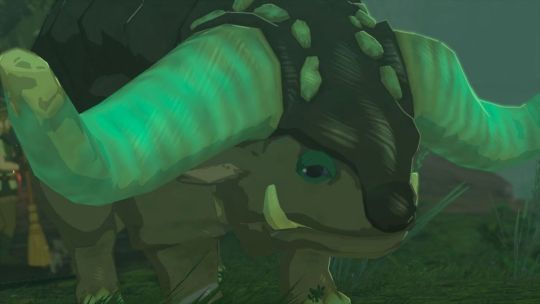
(good gem boys notwhistanding)
The Princess and the Beast
So, a couple of things about the setup. We are investigating potential Princess sightings; but at this point, either because we have already completed a bunch and know the general gib, because we have met a couple of wild Fake Zelda shenanigans, or through the simple fact that we are completing a side quest, we know there's a good chance it won't lead to an actual Zelda information. So when we ask Penn about what is going on and he replies with the ominous "we saw the Princess riding some kind of beast --a frightening one with huge, brutal tusks-- that the princess seemed to control", we get Ideas. Then the sidequest is registered: "The Princess and the Beast".
So. You know me. And if you don't know me, here's what you should know: my brain immediately flared up with the thought there was no way in hell this wasn't some kind of wink towards Ganondorf's renowned boarish beast form, especially given tusks were given so much focus.
My first assumption was: that's a miniboss right? I will get to fight some small boar-like thing that Fake Zelda rides sometimes. Cool! I didn't hold too hard onto my hope that the relationship of Zelda and/or Ganondorf to the natural world, or to each other would be expanded upon, since I had already been burned before, but my interest was piqued.
You have to understand how starved I was for any hint of complexity or mystery or ambiguity at this point. I was extremely eager for the game to throw anything at me that would surprise me, enlighten something pre-established, make the exploration lead to a meaningful discovery or deepening of characters, world or themes (and not just slightly cooler loot, or a bossfight, or a puzzle devoid of emotional context --cohesion and depth is what motivates my play sessions, especially in an open world game that I want to believe is worth losing oneself into). This was about the most intriguing task on my to do list at the moment, and so I plunged in immediately.
After really REALLY misunderstanding what I was supposed to do (I stalked every corner of every forest surrounding the tropical area at night or during blood moons in hope to see something --which was very much the wrong call), I arrived to the other stable, then was guided to the other side of the river where Cima awaits and explains that these creatures are actually a new species discovered by Zelda; that they are gentle and kind and not at all scary ("Dondons aren't beastly, they're adorable!"), and even somehow digest luminous stones into gemstones. They like the company of people and liked Zelda in particular.
I was... I felt two different ways about this conclusion, and I think it's worth to explore both: disappointment and some sort of... "huh!" Hard to describe this emotion otherwise.
I'll get the disappointment out of the way first, because it's the least interesting of the two. While I think the little emotional arc I was taken on was not devoid of interest --I was indeed taken on by the rumor and intrigued by its implications-- I wanted, well. A little bit more. And if the creatures were to be Zelda's pet project, I would have loved for them to be actually terrifying and feisty, and for her to develop an interest for these creatures in particular regardless. It could have been very interesting characterization that veered out of the perfect princess loving the perfect world floundering around her, always bringing her clear, practical benefits from the interaction.
(I have made another post that speaks of my discomfort that Zelda does everything everywhere and everyone loves her for it --I get what they were trying to go for, but it either lacks conflict for me to buy into that dynamic at the scale of several regions, or they went on too hard for my taste, as she is, at once and in the span of a couple of years at most: a schoolteacher, a gardener, an animal researcher, a scholar, a traveler, a military expert, a knower of landscape, a painter, a horse rider, an infrastructure planner, a [...] princess --at some point it begins to sound made up, "Little Father of the people"-esque to rattle the hornet's nest a little bit, especially if it's not shown as either a clearly godly characteristic or, even more necessary imo, a negative trait; another expression of her killing herself at work to compensate for a perceived flaw she's trying to earn forgiveness for, like she did in BotW. But that's another topic, and the clumsiness of her character arc has been well threaded by basically everybody disappointed in the story already.)
But, if I decide to be a little graceful, I'd like to explore my "huh!" emotion, and take it apart a little bit.
I think there's something interesting to have such strong parallels to setting up a story about the relationship between Zelda and Ganondorf ("The Princess and the Beast", like come on guys that's the conflict of over half the series), or at least Zelda and the concept of Evil since Ganondorf pretty much represents it in this game, and then have it go: actually, there was a horrible monster that everyone was afraid of, but Zelda was wise and patient enough to approach it and realize its potential beyond the tusks, what beauty can be brought upon the world if one makes the effort to look for what exists underneath. It says something a bit deeper about the world and about Zelda in particular. It intrigues, at the very least.
Is it a reach? Probably! Is my first interpretation that the quest is actually about "eww you thought Zelda would be interested in *disgusting vile monsters* and not sweet and gentle and human-loving animals that literally shit jewlery when cared for? jokes on you, she never would feel any ounce of sympathy for anything that isn't Good and Deserving" uhhh definitively truer? Probably! But I also don't want to dismiss that the quest made me think about it. If I had completed it earlier, I might have even felt like it was (very clumsy, not gonna lie) setup about the main conflict.
But that's also a good segway into my next section: the arbitrary limitations between the animal and the creature, the monstrous and the human.
And the fact that TotK points directly at it.
A Monstrous Collection
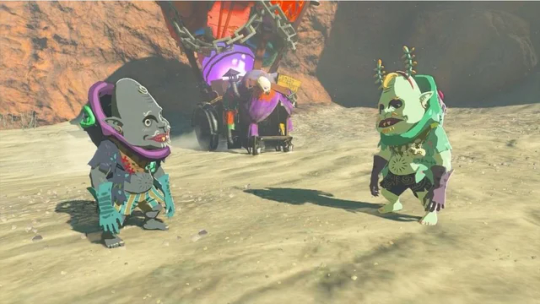
(these two guys are just. doing So Much and being So Valid despite being massive weirdos the game wants us to be slightly repelled by. I, for one, respect the Monster kinning grind and their general Twilight Princess energy.)
So. These two guys. There is so much to say about these two guys. I don't think I have seen the Trans Perspective on Kolton on tumblr, and I would love to get it because. I feel like it's a worthwhile discussion (just, how gender and identity is handled in TotK overall, I feel like it's a very complicated conversation and I have not seen super deep dives and I'd be very interested in hearing more).
Beyond the throughline of voluntary consumption of magical objects to turn into less human creatures being a weirdly prevalent plot point in TotK (Zelda, Kolton and Ganondorf casually transing their entire species for funsies --Ganondorf being particularly relentless with Fake Zelda, mummy/phantom shenanigans, Demon King and then literal dragon), I want to focus on Kilton a little bit.
Kilton is genuinely the only NPC in the game willing to acknowledge the inherent personhood that monsters have (the game does showcase them picking up fruits, mourning their boss if you kill them, being cutesy and happy to identify you as one of their own if you wear the appropriate mask --and that's not even getting into creatures like the Lynels, who seem to really edge on the limit of being a conscious creature with a system of honor and property and many other things). He does encourage us to think of monsters as more than a species whose only worth lie in how fun it is to eradicate them; even more, gameplay-wise, he does give us a reason to interact with them in other ways than just our sword with his museum. He does encourage us to see that beauty for ourselves and then select what we think is coolest/most intimidating/cutest/eight billion ganondorfs in every pose imaginable
The fact that Ganondorf is considered a monster was a great win for this feature in particular, and is very funny, but it's also... A lot, if we dig at it a little more than warranted. Beyond all of the Implications and all of the things of representation and political conflict and values already discussed ad nauseum: when did he stop being considered a human? What does that mean about the flimsiness of what is a monster and what is a creature and what is an animal and what is a person and what is even a hylian, as sheikahs got absorbed into the definition in this game? Especially with the stones taken into account, how profound changes in nature are a huge part of the plot (even when reversed and ultimately pretty meaningless): how easy it is, to make that slip? Who decides when that slip has been made? What is acceptable to hurt without remorse? What is beautiful and worth preserving? What is both at once? What is neither?
And again, in a classic Zelda conundrum (appreciative(?)): who the fuck gets to decide that, when, and why?
The Bargainers and the Horned God
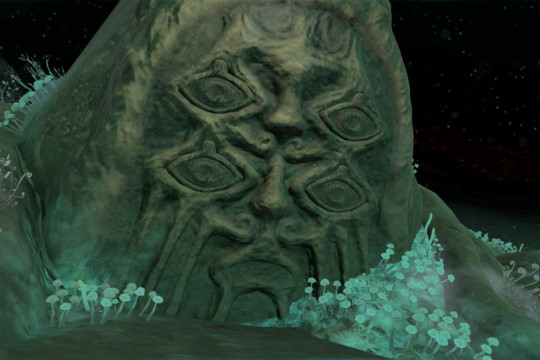
(major shoutout to these big guys for being the sole and only providers of actual depth to the Depths, and for looking cool as heck)
So. Let's move the conversation to the Depths.
Conceptually: what an interesting idea!! And so well executed (initially)!! A mirror world to the surface, dark and hushed and full of unknown creatures; haunted by gloom and sickness and the unknown. Not a first in the series, far from it: from ALTTP to ALBW, and even taking the Twilight world of TP into account, this idea of a Dark World acting as a deforming mirror to Hyrule and revealing many interesting aspects as we get to explore both is always a very interesting take on corruption and envy and fear/weakness and/or some sense of darkness looming under the perfect exterior. I'd argue even the Lens of Truth of both OoT and MM's serve a similar function, both gameplay-wise, but also in terms of theme: not everything is as it seems. In the world of Light, darkness must hide itself; but darkness also possess its own beauty, its own hardships, and will stare back at you without blinking if you go seek for it. It's, in my opinion, one of the series' most compelling conversation about the cyclical nature of fate, the coldness of godhood, and how small one feels in the face of a universe that is more complicated than it initially appears --which is why Courage must be invoked to push forward regardless.
The Depth's otherworldly ambiance is truy wonderful, whether in the plays of light and shadows, the creatures native to the environment we meet there (wish we met more!), the soundtrack, the strange aquatic/primordial plants, the fact that the dragons visit this place and connect them to the outside --invoking ideas of balance and interconnectivity, that the tree branches look like veins. The coliseums, the mines, the zonai facilities and the prisons do seem to poke at many things about what the relationship to the past was to this place; was it ever truly a place? Did it look like this back then? Why was it buried? Why did it come back? But in spite of it all, I think the Depths struggle overall to question or reveal anything about the surface that we couldn't already assume going in (that the only thing congealing there is Ganondorf's gloom, his lonely domain of Wrongness, only shared by Kohga and the yiga --the only naysayers of Goodness and Light, contemptful and blinded by self-importance and rage). The zonite is mined by gloomy monsters --why, what for?-- so any notion of greed and over-expansion that could have been associated to the zonai is now reabsorbed into Ganondorf's general evilness, since it needs to be reminded he is everything and anything bad with the world: darkness and conquest and greed and capitalism and pollution and bad weather and sickness and darkness and violence and war and death and betrayal and fakeness and lies and patriarchy and exploitation. No matter that he never does a single thing with zonite in the game; rather set up elements of conflict that never go anywhere than, for a second, let the foundations of absolute goodness and absolute evil risk becoming shaky --and you coming to this unwelcoming dark place that hates you, killing the miners and taking their resources for yourself is, on the other holy, royal fur-covered hand, utterly legitimate. The resources were once Rauru's after all, were they not?
And this is what I would say, except... except for the dead. The fallen warriors, the poes, and, most important of all: the Bargainer statues.
The Bargainers are, in-universe, godly creatures guiding the fallen to a place of final respite, regardless of moral alignment. The poes are all, fundamentally, cleansed of judgement: they are lost souls whose past reality does not matter anymore, and all deserve that peace regardless. In spite of the heavy paradise/hell parallels drawn in that game, with Rauru/Zelda/Sonia as the guardians of Light where Ganondorf gets to become a Devil-like figure, it is confirmed here that no such thing exists when you actually die in this universe.
It almost feels as if the fabric of Hyrule itself, in a brief moment that refuses to elaborate on its own point, goes: "yeah, whatever is happening here between Light and Darkness, it doesn't actually matter. This conflict is futile and doesn't understand the real nature of being alive, dead, a god, a person, a monster, an animal. The truth lies elsewhere --but you will never be told what it is."
It's: wild.
One of the game's most striking traits of narrative brilliance in my opinion --to the point where I'm wondering whether it's there on purpose or was effectively an oversight since every other aspect of reality breaks its own back trying to reassure us that everything is at its correct place, receiving the appropriate treatment by the universe in a way that is never to be questioned.
Another case of that ambiguity being allowed to exist without being immediately crushed and repressed is the case of the Horned God (interesting parallel to Ganon's actual horns that he develops in this game in case the hellish parallels weren't clear enough already): a demon Hylia sealed into stone and pushed far from humans in a clear case of questionable behavior since, while the Horned God isn't exactly nice, does propose a different philosophy you are not punished for exploring; and yet, a proposal that has seen itself persecuted in a very real sense by the goddess of absolute goodness, patron of hylians, Zelda, and many more. Pushed away from view.
Interesting.
And Yet, Light Must Prevail
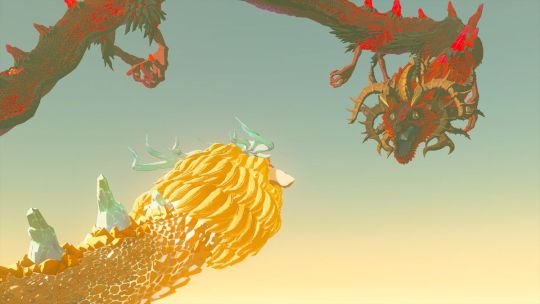
Okay, so, after all of this, we're left to ask... What the fuck is up with morality in Tears of the Kingdom?!
What do we trust? These half-breaths in the occasional sidequests that Light and Darkness is just the wrong frame of reference, that nature cannot be this simple, is ever-shifting and can be recalled or reaffirmed by arbitrary forces, and might even not matter at all in the universe's fabric, despite having so much of its lore soaking in the dychotomy? Or... everything else about the game, this insistence that Good must not only be assumed as whatever tradition the kingdom has passed down for thousands upon thousands of years, but remain utterly unquestioned the entire time? That Bad is without cause, graceless and unworthy of investment?
Are the Bargainer's statues the only thing worth listening to, that morality is a fable the living tells themselves --or should we be moved when Darkness destroys Light, when Light suffers to preserve itself and the world --but not when the Other is rightfully slain?
Was Kilton correct to see beauty in the monstrous? Was Kolton onto something when he let go of his previous form because there is no clear distinction between what should receive an arrow to the face and what shouldn't? Or should we rather focus on Zelda losing her human form as a beautiful and tragic sacrifice --but something that never actually altered her nature as a hylian, the descendant of a lineage of Good Kings meant to rule forever?
Is the Dondon good because it always was, or was it worth Zelda's love in spite of the fear it initially provoked?
Either way, at the end of the game, evil is slain. Ganondorf is, not killed, but --like his angry BotW boar counterpart-- destroyed, as monsters tend to be. He explodes over the lands of Hyrule, freed from Darkness; freed from everything wrong, since the foreign menace that embodied it all was wiped out in one fateful sweep of a holy blade cradled in sacrificial love. Nothing wrong remains. The Sages reaffirm their vows to protect the kingdom forward, and a very human --hylian-- Zelda smiles: Hyrule now forever and ever basked in eternal Light.
#totk#thoughts#tloz#totk critical#when will my brain return from the imprisoning war...#ganondorf#zelda#rauru#bargainer statue#kilton#kolton#dondon#this one gets a bit conceptual but#morality in totk is SUCH a headscratcher#I think this ambiguity is genuinely the only thing that keeps my brain interested in the subject#I am of the opinion that there was a big rewrite at some point#that severely simplified the conflict#and that morality was initially more a topic in TotK because.... the traces do seem to remain#it could also 100% be a case of developers not caring about themes at all whatsoever#and not realizing what they are saying or putting into question#but#worth pondering upon
357 notes
·
View notes
Text
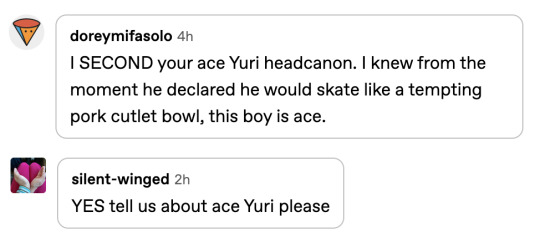
ok I am in fact using this as an excuse to make a long post about this thank you thank you asjksdjfaljdf
---
Interpreting Yuri as asexual is my very very favorite type of headcanon, which is one that 1. is compellingly coded in the source material (even if that wasn't the creator's intent), 2. is thematically relevant to what the piece of media is Trying To Do as a whole, and 3. just means a lot to me, personally, because I said so.
Coded in the source material
Yuri’s short program is “eros”, aka desire (you can interpret what “eros” means in various ways, but YOI itself explicitly refers to sexual love, at least in the English translations). Yuri struggles with this. Hard. He can’t come up with an answer when asked what eros means to him. His big revelatory moment about desire is that it’s how he feels about wanting to eat his favorite food (omg… boy). Even as the season goes on and the way he views the Eros program changes, the program doesn’t ever really embody the idea of eros as sexuality or romance (which was how the other characters expect him to interpret it) but rather as a desire to keep Victor in his life.
Like look. I’m obviously not going to say that the creator intended any kind of ace subtext to be there. I kind of doubt it was her intent. But goddamn is the subtext there.
2. Thematic relevance
The central theme throughout YOI is “love”, and especially loving people in a way that inspires you both to be your best selves: Yuri learning that the people in his life truly love and support him; Victor finding someone who makes him feel joy about skating again.
Like, Yuri’s whole skating theme for the Grand Prix is literally about him exploring what love looks like to him, even when it takes a form that other people don’t totally understand. Viewing all this through a lens of him being ace is really compelling. It adds depth to the idea of learning how to express the way you feel love even when it looks different than what other people expect. I think it’s a really delicious layer that adds even more nuance to what the show is getting at.
Besides, it’s an interesting way of viewing the criticism of the show that occurred for it not being 100% explicit about them being a couple (aka people getting mad because the kiss in ep 7 is blocked by Victor’s arm lmaooo). Like, ok, did you see the ending scene of ep 9? Did you see ep 10??? They definitely, definitely love each other, in whatever way that means for them. Their relationship takes a form that’s pretty different than the other way people in the show are going about romantic relationships, but that doesn’t mean it isn’t real for them. That is very much in line with the main themes of the show.
3. Means a lot to me
In the final scene of the penultimate episode, Yuri tells Victor that they should end their coaching relationship after the Grand Prix ends. This is because he thinks he’s holding Victor back, that Victor would be happier being free to go back to skating on his own instead of being Yuri’s coach. When I watched this (and, I’ll be honest, this is completely me projecting here) I REALLY interpreted this as an ace thing. I think it’s pretty easy to internalize the idea when you’re asexual that you just won’t be… enough, for other people. In my case I ended up a strong impulse to self-sabotage relationships because I would rather be the one to end things than to let someone else tell me that who I am as a person is fundamentally lacking. Yuri destroying a connection he desperately wants because he thinks there’s something about him that is holding Victor back from a life he’d be truly happy with? Oh yeah. I can fucking relate to that.
Also: YOI came out in 2016, which was the absolute peak of hostility to ace people I was seeing on this site. It was bad here. At the same time Tumblr was going wild over this show. Everyone was watching it. Seeing a whole site of people absolutely adore a character I very deeply in my heart believed to be ace? Extremely vindicating.
---
In conclusion Yuri is asexual because it is fun and interesting that way, and also because of this:
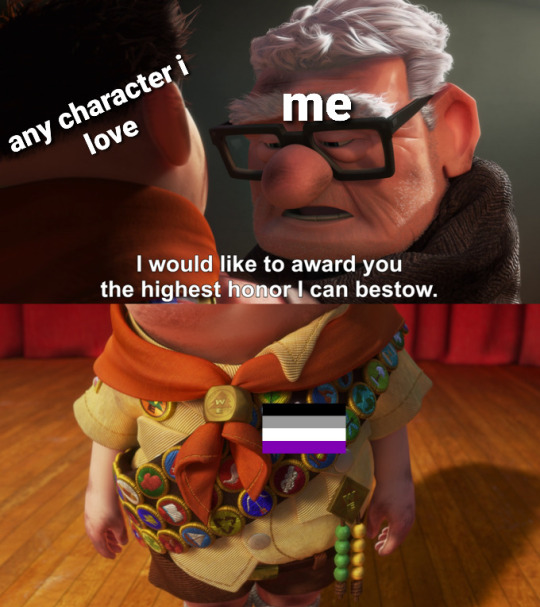
#like it adds so much to the show if you view it through this lens! it's really good!#same reason for why I hc zuko as gay like ->#yeah ok you don't *have* to see it this way... but don't you want to live deliciously (in your media analysis)???#yoi#yuri on ice#thank u for giving me the excuse to finally post about this lol this has been building in my head for literally the last 8 years
111 notes
·
View notes